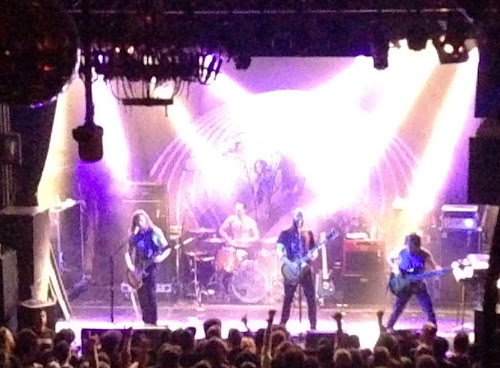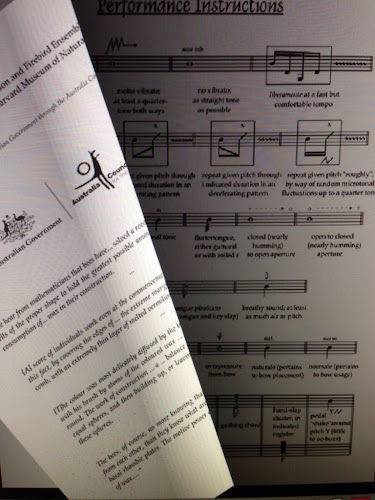I once tried to develop a theory about how many great bands achieve their peaks essentially through human sacrifice. The Stones had Brian Jones, Pink Floyd had Syd Barrett, and Metallica had Cliff Burton. The fact is, however, that just as often death dooms a band, as in the case of Led Zeppelin. In any case, not even the most rabid fan would wish death or destruction on another human being just so we could get to the Dark Side Of The Moon. Still, when the tour bus containing Baroness and their crew tumbled off the road in England last year, there was that uncomfortable feeling of "here we go again."
Fortunately, everyone on that bus survived, with many injuries and a long road to recovery ahead. A great deal of uncertainty was put to rest when the band announced in March that they would go on, but that drummer Allen Blickle and bassist Matt Maggioni "will not continue touring with Baroness." If that seems somewhat ambiguous about their membership in the band, the notice also said "Simply put, some of the effects and injuries were severe enough to prohibit further activity in Baroness."
The band got back on the horse with two new members: Nick Jost on bass and keyboards, and Sebastian Thomson on drums and percussion. Thomson, late of Maryland post-rockers Trans Am, is an especially interesting pickup for a metal-ish band from Georgia, but considering the monstrous grooves of recent songs like Board Up The House, an exciting choice. Of the two members they replaced, only Blickle dates back to the band's beginnings; Maggioni had been with them for a less than a year, having replaced founding member Summer Welch in 2012.
So this is the continuing tale that brought a sold-out crowd to Irving Plaza on August 14, a day before the one year anniversary of the accident. I admit to being double-booked and missing the opening act, Royal Thunder, so I can't comment on them. I can say that when I took my place on the mezzanine just minutes before Baroness took the stage, the audience was buzzing and well primed. That likely would have been the case anyway, as the band has been building a devoted following for the past decade with their blend of melody, crunch, and epic sense of structure and dynamics.
Like any band that comes from a subculture, Baroness's audience feels proprietary about their sound and hurled a few brickbats when Yellow & Green was released last year, with the usual complaints about them getting soft, selling out, etc. While that double album did have a larger share of acoustic and reflective moments (and prescient ones - see the lyrics above), the truth remains that Baroness were always experts at expanding on the "light and shade" template that Jimmy Page built Led Zep on. Songs like Rays On Pinion from their debut full-length The Red Album build up so gradually that it's like a black pepper chocolate truffle - seductively smooth until you feel the burn.
No fan could have complained when they kicked off with the stately beginning of Ogeechee Hymnal and then slammed into a maximally heavy Take My Bones Away that had the crowd churning and singing along. John Baizley, the impressively bearded heart and soul of the band, was in fine voice and dashed off complex guitar lines with aplomb, often in a twin-lead entanglement with guitarist Peter Adams. They were both fond of stepping to the front of the stage and standing tall while doing so. There was a sense of hard-earned pride and triumph in their body language, which coupled with their astonishing energy and power made for a thrilling night. Adams had a habit of pointing grandiosely at his colleague as if to say, "Can you believe this guy?" and Baizley (who also creates all the artwork for Baroness) is indeed a phenomenal talent.
While sometimes lyrically obscure and favoring musical intricacy over direct communication, the boys of Baroness are not afraid to be vulnerable and are capable of writing songs that are deeply moving. This even goes for their occasional instrumentals, starting with the magnificent Grad on The Red Album, and continuing with the Green Theme from the latest album, which was an early highlight of the set. Listening to its wailing guitars, I found a lump forming in my throat, not only due to the inventive melody, but also due to contemplating what might have been - and how far they've come. A storming take on Swollen And Halo, from 2009's The Blue Album, was followed by Board Up The House from the new album, which swung harder than ever, no doubt aided by Thomson's locked-in drums. Nick Jost was more effacing than the shirtless beast behind the skins, but ably handled the bottom end, switching easily to keyboards as required.
The concert was a continuous lesson in the awesome power, precision and passion four musicians can bring to the stage. Throughout the night, the two frontmen didn't miss a step and showed no signs of physical limitation, eagerly returning to play a three song encore, which the crowd just as eagerly demanded. My only complaint is that we had to wait until the last of these, Isak, to hear anything from The Red Album. Aside from that, it was an expertly sequenced and satisfying set. While it remains to be heard what contributions their new members will make to the future of Baroness, this blistering night proved that the present and past of this massive sounding band - one of the best in the country right now - is in very good hands.





